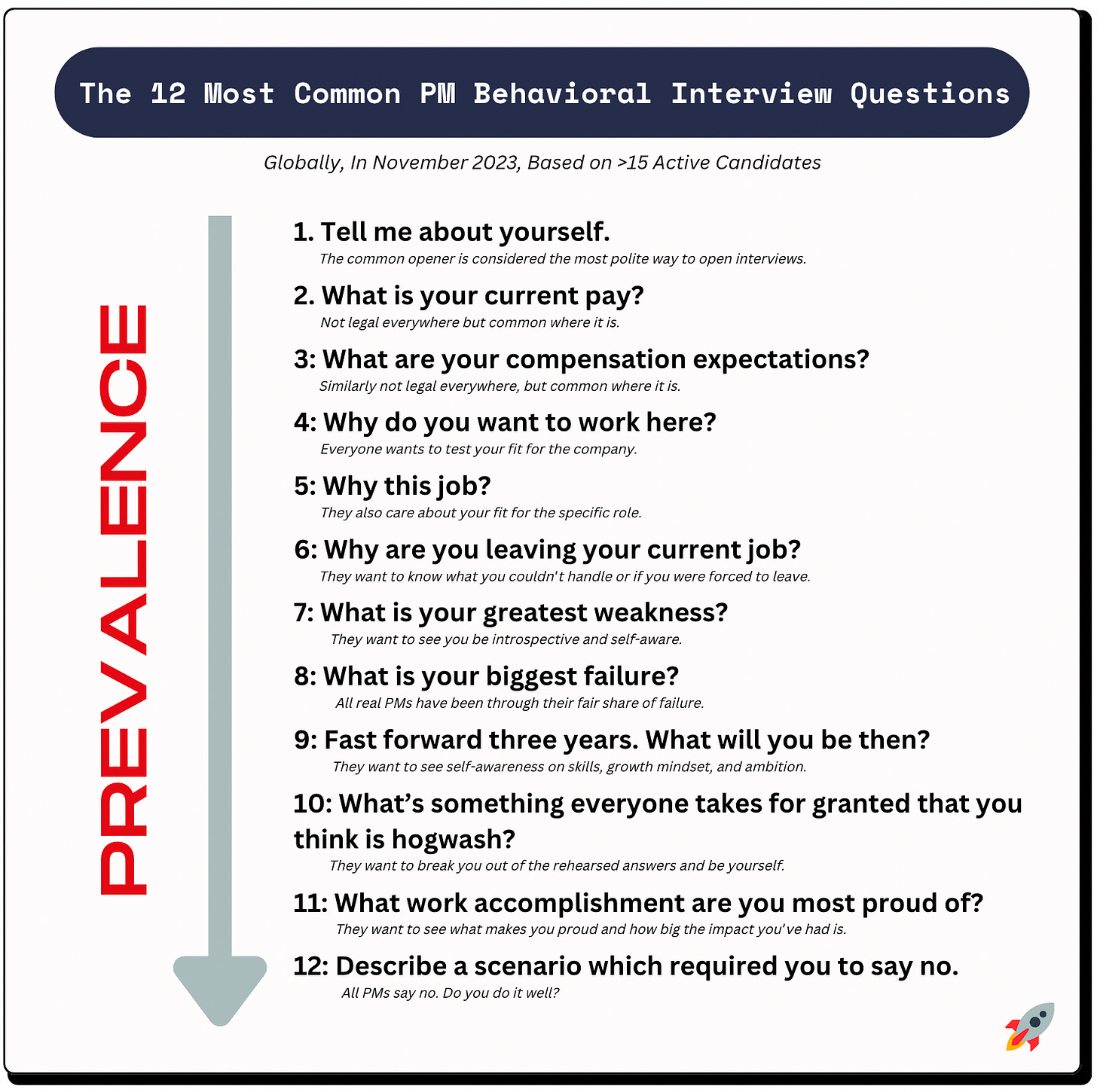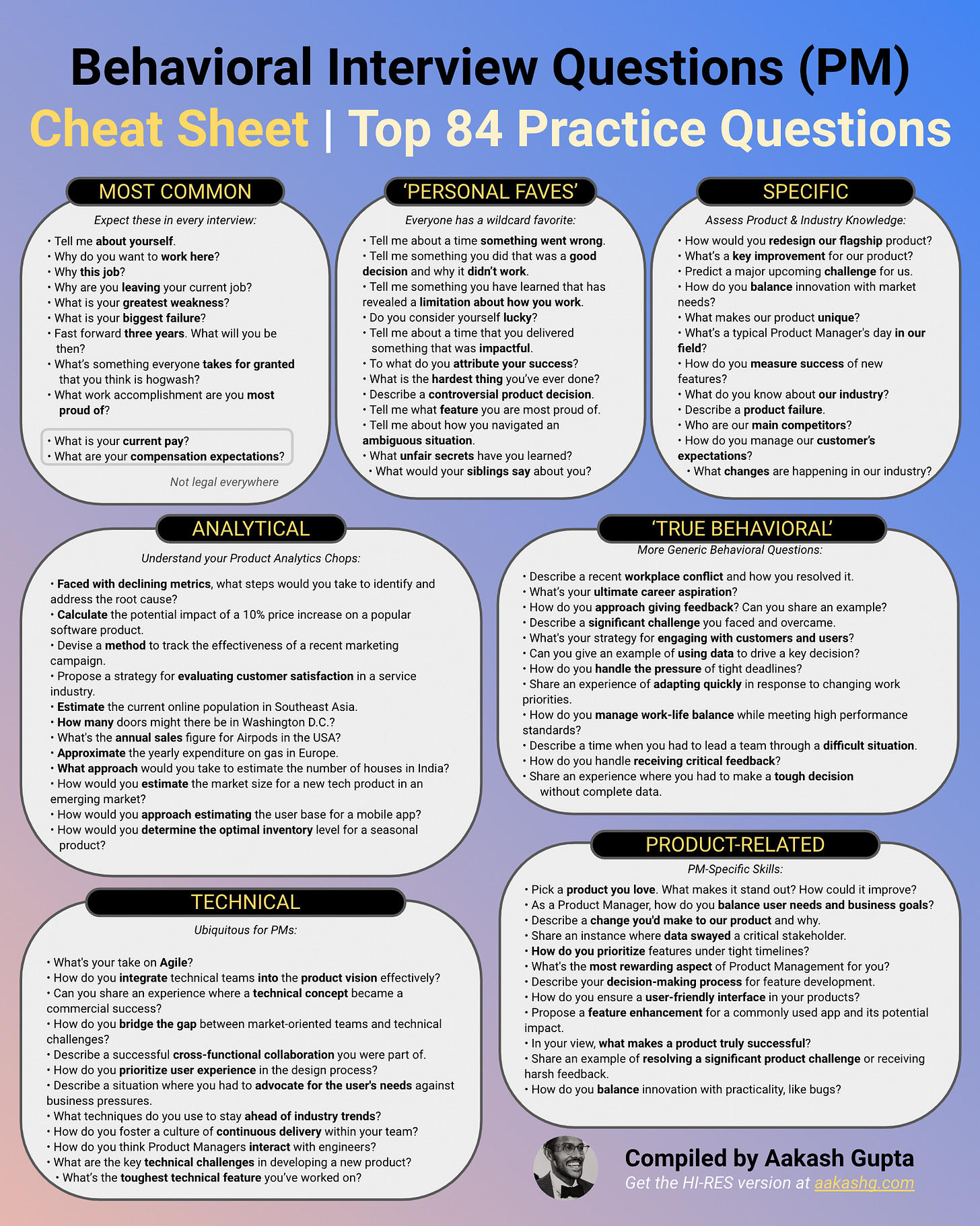Conquer Behavioral Interviews (Forever)
Acing the inevitable questions you'll hear when job searching
I’ve been working with a lot of subscribers to help them snag their next PM job.
By far the most common failure I’ve been running into recently with folks is they successfully run the How to Get Interviews playbook, and they do well on cases, but then actually fail a behavioral round.
Especially as you get more senior, these rounds are all that matter. The thing is: We all tend to take this for granted. We’re experienced interviewers after all, right? But PM skill and PM interview skill are two different things.
Luckily, I’ve been able to turn around this blocker for several people who have since gotten jobs. So, in today’s post, we’re going to super deep on what works to answer the most common questions you encounter in behavioral interviews. Over 6,500 words, we’ll cover:
The 12 most common questions to know
The next 72 most common questions
Going deep on the top 12 questions
The timeless principles to know
This is the weekly ‘Getting a Job’ series, where I help you land your next great gig. If you prefer to strictly receive the product content, manage your subscription here.
1. The 12 most common behavioral questions
I’ve worked with over 15 candidates in the past month. Here’s what people are asking in December 2023 - from most to least common:
I’m going to cover each one of these in depth. But before we get there, let’s also get an idea of the universe of questions you might be asked.
2. The other 72 most common behavioral questions
There’s also a long-tail of other questions that people might ask. I break these into 6 additional categories:
Between these 84 questions, you can focus most of your practice here - and then feel prepared for your interviews.
3. Going Deep on The Top 12 Questions
Now for the meat of this post, let’s get into deep dives on all of the top questions.
Question 1 - “Tell me about yourself”
This question is so important that we’ll dedicate the most time here. I even made an edited video on it:
Here’s the breakdown in written form:
Most people know that your answer to the tell me about you question influences the entire rest of your interview. But what most people miss is that a bad answer gets you rejected.
You never get a second chance to make a first impression. Most hiring managers make up their mind in the first 3 minutes. When hiring over 50 PMs myself, I didn’t always choose to reject someone over this question, but I did reject many.
So let’s dive right into the three main things you need to know:
How to structure a strong answer using the addressing weaknesses framework
Making the role you are interviewing for seem like a great next step in your narrative
How to avoid the most common mistakes people make
1. How to structure a strong answer using the addressing weaknesses framework
This is the most powerful way to answer this question. The trick is to ask: What are the weaknesses in my candidacy?
Interviewers are looking at your resume while you’re answering this question, or just looked at it. They have formed certain opinions about weaknesses in your candidacy. You need to address what they perceive are weaknesses and shine a spotlight on your strengths.
The fastest and most objective way to do this is to return to the job description. Yes, most of those things are copy pasted junk. But they still are the best source of signal for you on the job.
Let’s say I’m this PM from Microsoft:
3 years at Microsoft, 1 year at Wayfair
MBA, Deloitte before that
And I’m applying for this job at Tinder:
Working on AI, ML including on the Vision Pro
Looking for 6 years of consumer growth experience
The job is looking for 6+ years of consumer growth experience. But the candidate was a consultant before her MBA, so the specific consumer growth experience is about 4.5 years. So this is the first weakness.
The job is also focused on new hardware platforms like the Apple Vision Pro, but the PM doesn’t have experience with that. So this is the second weakness.
Finally, the job is at Tinder, in the dating realm. The interviewer is naturally going to resonate more with dating candidates. The candidate hasn’t been in dating.
The answer we come up with should address all three of these weaknesses head on. And it should emphasize the candidate’s strengths:
Since graduating from my MBA at Duke in 2019, I’ve been a PM at Wayfair and Microsoft.
At Microsoft I launched Copilot for Teams, for which I got the opportunity to present on stage.
I also worked on Teams across a variety of hardware devices, including MacOS, Windows, Chromepad, Android, and iOS.
Although I’ve been a PM in consumer products for 4.5 years, before my MBA, at Deloitte I actually worked as a PM consultant for a variety of other consumer products. So my total time as a PM is about 7 years.
One of my clients at Deloitte was actually a competitor of Tinder’s, a large public company.
This is how you actually influence the course of the rest of the interview, You have head on brought up the topics that the interviewer might consider weak about your candidacy.
The big mistake that most candidates make is that they let these weaknesses linger in the interviewer’s mind. So the follow-up questions from the interviewer all revolve around those weaknesses. On the other hand, this framing lets you lead with strengths.
2. Making the role you are interviewing for seem like a great next step in your narrative
Have you ever asked someone if they wanted something and they just felt disinterested? This is exactly how you do NOT want your interviewer to feel
People who get the job seem excited about the role they are interviewing for. Let’s go back to our example. This role at Tinder is about things like working on Vision Pro and AI. You should incorporate your interest in those.
Here’s how you could add this in to your answer:
With my experience working on Teams Copilot using GPT-4 at Microsoft, I’m very excited about this role.
I believe that AI will be at the forefront of all next gen products.
So although things are going well at Microsoft, I was really excited when I saw this job posting and had to apply.
The key to answering these questions is realizing that humans think about careers linearly. Even though your career has likely been a rocky path, help the interviewer understand the straight lines that bring you here.
For our candidate, she has connected that back with AI. Make your own linkages
3. Addressing the key mistakes that most people make
Mistake 1: Bringing up things that they can’t dig into
All the details you bring up, you should be able to tell lots of details about if they ask follow-up questions. Refresh the details before your interview.
You should just have a highlight in your answer. But be ready to go deeper.
Mistake 2: Going way too long
This is by far the most common reason I have rejected candidates. They just take up most of the interview time. Practice this question before the interview and have a hard stop of 2 minutes.
Do not go longer than 2 minutes.
Mistake 3: Not having an easy to follow narrative
This looks something like a jumble of a structure. Jumping from one job to the next.
Whether it’s chronological, or reverse chronological, try to have some flow to your answer. The best way to do this is to draft your answer to this question before every interview. Then record yourself on video and finesse your response
Putting It All Together: Example Answer
Now let’s put that all together for our good answer.
But this time - let’s have a new example. Let’s pretend I’m a college student (more info), and I’m interested in an APM program at Spotify. My weaknesses are I don’t have a PM internship, I haven’t worked in the music industry, and I went to a middling school.
I am really excited about this role at Spotify. I have been using Spotify for over 10 years now. I constantly have ideas for how it could be better.
That’s because I actually worked on several side projects in college in a similar space. One of my favorites was Generate a Song with AI. This was a website I released that leveraged the latest APIs from Meta.
With my CS background, I was able to build the app myself. And I grew it to 5,000 users. The fun I had with that makes me really excited about Spotify’s APM program.
I want to spend my career in product management. When I did my software engineering internship at Amazon, I loved working with PMs. It made me realize that is the job I want to take up in my career.
It’s the intersection of my technical, music, and builder talents.
How did this answer stack up against our three criteria?
The answer addresses all three weaknesses.
The answer also expresses interest in the role.
The answer also is quite concise and includes details about stories of coding side projects that the candidate is ready to go deeper on.
Now we’re going to give the same treatment to the other 11 most common questions.
Question 2 - “What is your current pay?”
Keep reading with a 7-day free trial
Subscribe to Product Growth to keep reading this post and get 7 days of free access to the full post archives.


